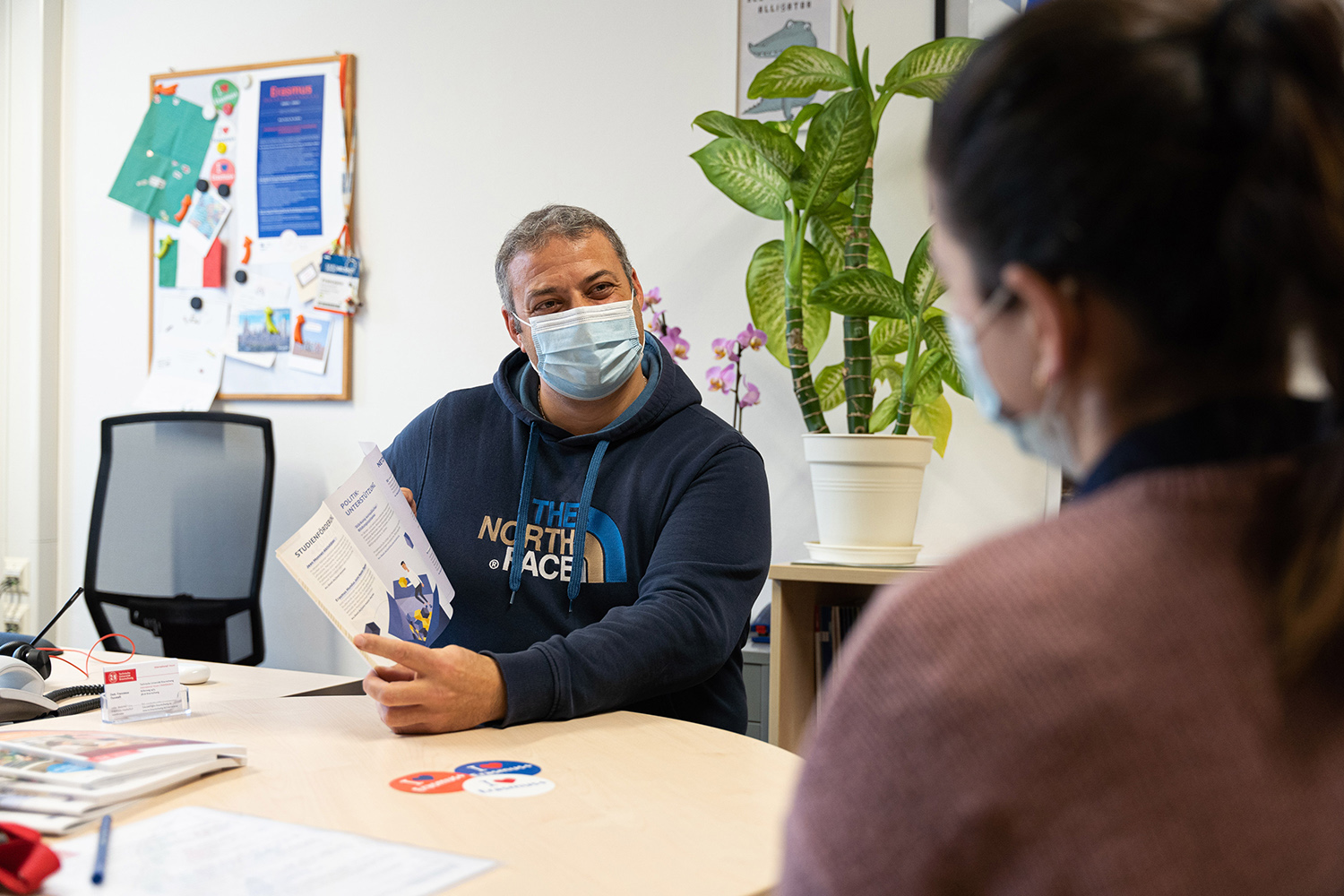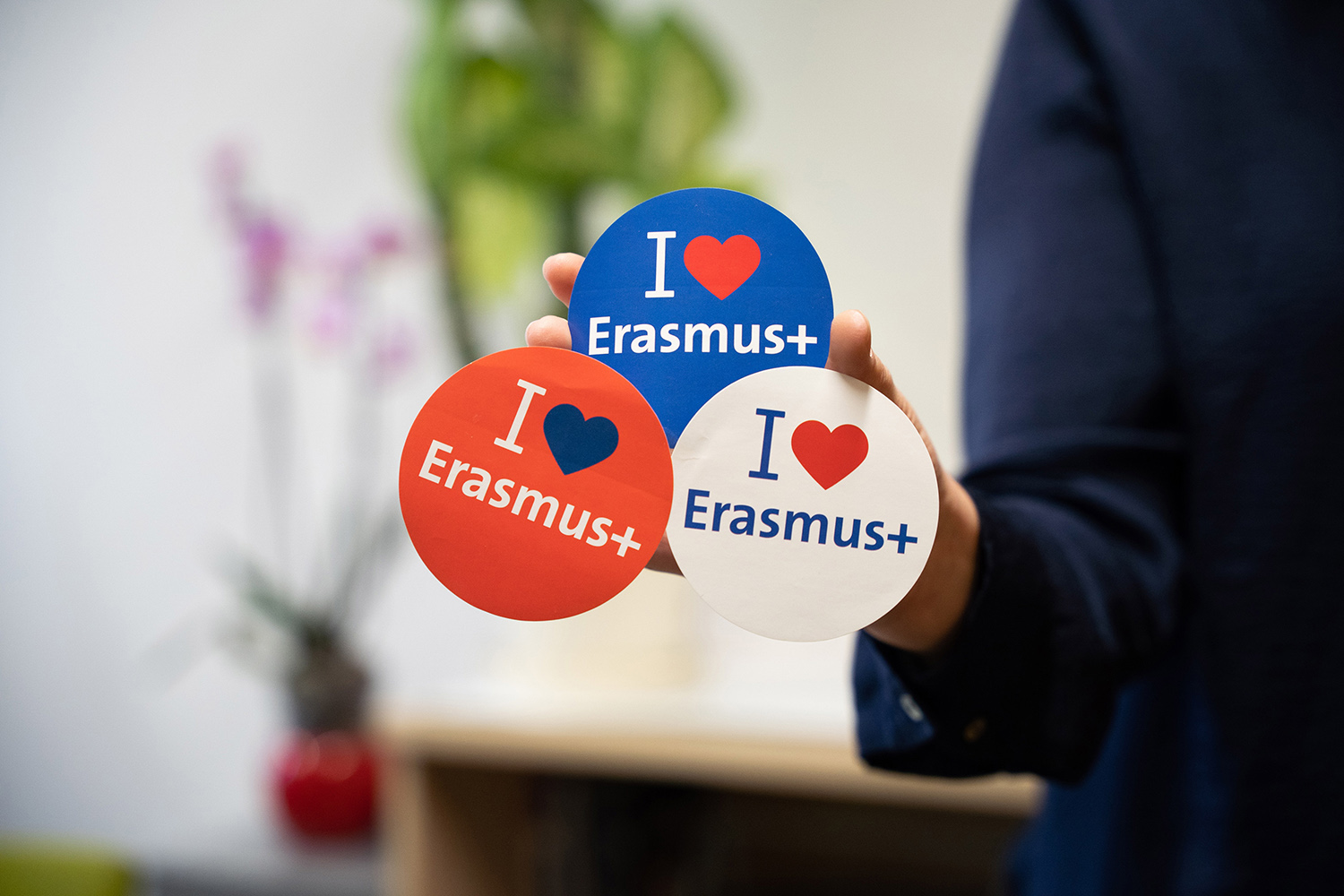More Digital, Inclusive and Greener: New Generation of the Erasmus Programme has been Launched Application deadline for the academic year 2022/2023 ends on the 31st of January
Erasmus was launched 34 years ago, in 1987, as an exchange programme for students. Since then there have been considerable developments and the EU education programme has continuously evolved. Now, in 2021, a new generation of Erasmus programmes has begun, bringing with it many exciting innovations.

The Mobility Office of the International House advises potential Erasmus+ students or staff members on the various possibilities of the programme. Picture credits: Daniel Götjen/International House
Erasmus+ is to become a more digital, greener as well as more inclusive programme. These are the major guidelines for the next six years. Some innovations have already been implemented, others are still in the draft stage. Particularly in the area of digitalisation, the Corona pandemic has contributed to the emergence of new forms of mobility. In addition to the classic physical stay abroad, students can now choose additional exchange formats such as “blended mobility”, “virtual exchange” or “virtual mobility”. In these cases, they complete either part or all of the exchange virtually. Intercultural elements are also partly offered virtually in order to promote European exchange across national borders.
“Compared to physical mobility, virtual exchanges naturally offer fewer opportunities to really get to know the culture and people of another country. You have to be realistic about that,” says Erasmus+ Institutional Coordinator Francesco Ducatelli. “But especially for those for whom a physical exchange is not even an option for various reasons, a digital format is a great alternative.” The prerequisite for this is that the destination university offers sufficient online courses. Here Erasmus+ is counting on digitalisation in teaching to continue even after the Corona pandemic. But even beyond online teaching goals, the aim of the new generational programme is to further digitalise the processes within the exchange programme and make “Erasmus without Paper” a reality.
Equal Opportunities for All and New Goals
The second major guideline of the new Erasmus+ programme deals with the topic of inclusion. The aim is to make the programme more attractive in the future for those who have not had access to it so far because of social reasons. Equal opportunities are the keywords. Whether people with disabilities, students with children, first-time graduates with or without a migration background or students from certain subject groups: Starting 2021, the aim is to attract more people to Erasmus who have not used it at all or have rarely used it. All Erasmus partner universities are committed to introducing the less represented target groups to the programme. “We can best talk about special circumstances of any kind in a personal exchange. It’s worth taking advantage of the opportunities Erasmus+ offers and not being deterred by possible hurdles,” Ducatelli emphasises.
By 2027 – that’s how long the new programme generation will run – Erasmus+ also wants to become greener and thus more sustainable. Initial ideas such as training participants to become ambassadors for sustainable development in the host country are already being discussed. Additionally, participants are to be motivated to travel by more sustainable means of transport and will receive financial support for this.
For all those who are interested in a stay abroad outside of Europe, there is another exciting addition: in the newly innovated programme, stays outside of Europe can be funded. The prerequisite is that bilateral exchange agreements exist between the participating universities. “This is a great new opportunity that expands the boundaries of Erasmus mobility,” Ducatelli is pleased to say. “Our goal is to be as geographically diversified as possible.” However, he explains, “Negotiations with overseas partners are still ongoing and many details still need to be clarified. We therefore ask for your understanding that it will take a few more weeks before we can provide more detailed information on the Erasmus overseas opportunities.”
With the start of each new generational programme, negotiations also take place between the European Erasmus+ partner universities. In the current extension phase, TU Braunschweig has been able to extend about 75 percent of its contracts. “It is a good sign that so many European universities want to continue the Erasmus exchange with TU Braunschweig. Unfortunately, however, some partners who are very popular with our students have also ended their cooperation. Here we as a university have to pull together and become a more attractive partner again, especially by expanding the amount of courses taught in English,” Ducatelli emphasises. “The new online directory for courses taught in English is an important step in this regard. It shows the range of English courses at TU Braunschweig. However to remain attractive to international exchange students in the long term, we need to increase the offer – ideally to 30 ECTS per semester in each subject area,” he explains.
Application Deadline is the 31st of January
Students who are thinking about going abroad for a semester with Erasmus in the academic year 2022/23 must act soon: The application deadline is the 31st of January 2022. However, there is still the possibility of obtaining a place at short notice via a remaining place exchange until around mid-March. There is no fixed application deadline for internships abroad with Erasmus. However, interested parties must take into account the application deadline of eight weeks before the internship at the latest. “To get an overview of the Erasmus programme, our monthly information events are a good first point of contact. Here, students learn how the programme works, what financial support is available, and how to apply,” explains Ducatelli.
There will be an additional Q&A on the TU Braunschweig Instagram channel at the beginning of December, where students can ask their questions about Erasmus.
Text: Henrike Hoy/International House

